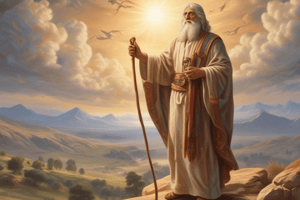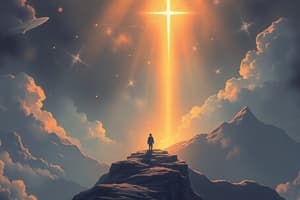Podcast
Questions and Answers
Which of the following best describes the role of scripture in missional hermeneutics?
Which of the following best describes the role of scripture in missional hermeneutics?
- An authoritative guide for communities of faith to understand and participate in God's mission in the world.
- A symbolic text that reveals universal truths, independent of specific historical events. (correct)
- A historical document that provides cultural context, but has no direct implications for contemporary missions.
- A collection of stories to be interpreted subjectively, based on one's own personal experiences.
What is the distinction between 'mission' and 'missions'?
What is the distinction between 'mission' and 'missions'?
- 'Mission' refers to local outreach, while 'missions' refers to international outreach.
- There is no distinction between the two terms; they are interchangeable.
- Mission: All God is doing in His purpose for creation and all God calls us to as we cooperate with His purposes. Missions: Activities God’s people engage in as we partake in God’s mission (correct)
- 'Mission' is what God is doing in the world and 'missions' are the specific activities that God's people engage in as they participate in God's mission.
How does the character of God relate to the redemptive mission?
How does the character of God relate to the redemptive mission?
- Our personal desires are central when discerning God's redemptive mission.
- Cultural expectations help to shape the redemptive mission.
- The character of God, not the needs of the world, shapes the redemptive mission. (correct)
- The needs of the world dictate how we understand God's mission.
In the context of Deuteronomy 7:6, Exodus 19:4-6, and 1 Peter 2:9-10, what common purpose does God have for His people?
In the context of Deuteronomy 7:6, Exodus 19:4-6, and 1 Peter 2:9-10, what common purpose does God have for His people?
According to the scriptures used by Chris Wright, what is humanity's role in creation?
According to the scriptures used by Chris Wright, what is humanity's role in creation?
What is the significance of the Abrahamic covenant in the context of the Great Reminder (Matthew 28:19-20)?
What is the significance of the Abrahamic covenant in the context of the Great Reminder (Matthew 28:19-20)?
How do the stories of Rahab, Ruth, and Jonah connect to God's redemptive plan?
How do the stories of Rahab, Ruth, and Jonah connect to God's redemptive plan?
What does it mean for God's people to be 'holy' and a 'kingdom of priests'?
What does it mean for God's people to be 'holy' and a 'kingdom of priests'?
How does the 'blessed to be a blessing' pattern in Genesis 12:1-2 extend throughout the Bible?
How does the 'blessed to be a blessing' pattern in Genesis 12:1-2 extend throughout the Bible?
What did Jesus' ministry to the Samaritan woman (John 4) and the centurion (Luke 7) reveal?
What did Jesus' ministry to the Samaritan woman (John 4) and the centurion (Luke 7) reveal?
Why is the church considered essential to the mission?
Why is the church considered essential to the mission?
Why is Pentecost essential for sustaining God's redemptive mission?
Why is Pentecost essential for sustaining God's redemptive mission?
What is the primary emphasis behind the seven outpourings of the Holy Spirit in Acts?
What is the primary emphasis behind the seven outpourings of the Holy Spirit in Acts?
According to Paul's description of 'Every spiritual blessing,' what does it mean to be 'sealed with the Spirit'?
According to Paul's description of 'Every spiritual blessing,' what does it mean to be 'sealed with the Spirit'?
What practical actions demonstrate faithfulness toward missionaries from the sending church?
What practical actions demonstrate faithfulness toward missionaries from the sending church?
Flashcards
Missional Hermeneutic
Missional Hermeneutic
Hearing the scriptures as an authoritative guide to God's mission, enabling faith communities to participate fully.
Mission
Mission
God's activity in creation and all He calls us to as we cooperate with His purposes.
Missions
Missions
Activities God’s people engage in as we partake in God's mission.
God's Character and Redemption
God's Character and Redemption
Signup and view all the flashcards
Deuteronomy & Exodus Connection
Deuteronomy & Exodus Connection
Signup and view all the flashcards
The Great Reminder
The Great Reminder
Signup and view all the flashcards
Genesis 10-11
Genesis 10-11
Signup and view all the flashcards
The Story of Jonah
The Story of Jonah
Signup and view all the flashcards
Holy People
Holy People
Signup and view all the flashcards
Priestly Living
Priestly Living
Signup and view all the flashcards
Deuteronomy 6:4
Deuteronomy 6:4
Signup and view all the flashcards
The Church's Mission
The Church's Mission
Signup and view all the flashcards
Critical Empowerment
Critical Empowerment
Signup and view all the flashcards
Uncompromising Claims
Uncompromising Claims
Signup and view all the flashcards
Representing God
Representing God
Signup and view all the flashcards
Study Notes
Missional Hermeneutic
- It involves interpreting the scriptures as a guide for participating in God's mission, allowing faith communities to engage fully
Value of Missional Hermeneutics
- Provides a framework by positioning believers within a grand narrative of redemption
- Lends symmetry to the study of the Bible
- Prevents getting lost in complex biblical narratives
Missional Direction in Biblical Narrative
- Creation (Genesis 1-2): God created heaven and earth, with humanity as the pinnacle
- Fall (Genesis 3-11): Human sin disrupts creation, permeating all order
- God's holiness and love is evident in the Tower of Babel narrative, initiating steps toward redemption
- Israel (Genesis 12:1-3): Israel emerges as the initial form of God's people, showcasing a redeemed community aimed at serving nations via prayer, worship, wisdom and prophetic reminders
- Jesus: Jesus inaugurates God's reign on earth as the Messiah and Redeemer
- The Church: Functions as a complete representation of God’s people
- It is a community sent for eternal purposes
- New Creation (Revelation 20-21): Represents the culmination of redemption, fully countering sin's effects on creation
Mission vs. Missions
- Mission: Encompasses everything that God is doing in creation and what He calls humanity to in cooperation
- Missions: Specific activities that God's people undertake to partake in His broader mission
God's Redemptive Mission
- Shaped by God's character, independently of worldly needs or demands
- Originates from God's inherent nature and is not a human-engineered plan
Deuteronomy, Exodus & 1 Peter Connection
- Deuteronomy & Exodus: God embodies His mission in a community and chooses them as His special people
- 1 Peter: The concept of Christians being called out as God's special people and a holy nation mirrors the language in Deuteronomy & Exodus
Chris Wright's Scriptures on Creation
- Genesis 2:15: Humans were created as servants of creation, responsible for tending it
- Psalm 148: Emphasizes that all creation reflects God's work and glory
- Psalm 96:10, Isaiah 65:17, Romans 8:18-25, Revelation 21: Redemption extends to all of creation
- Psalm 108:5, Isaiah 42:6, Acts 1:8, Philippians 2:10-11: The entire world is the scope of God's redemptive plan
The Great Reminder (Matthew 28:19-20)
- The Bible depicts a unified redemptive narrative with diverse stories
- Blessing others is mandated through Abraham's family, indicating that those blessed by God should bless others
- God’s redemptive saga reveals the character of in its complete form, and was active even in the Old Testament
Beginning of Redemption
- Genesis 10-11: After Noah, societies became complex and self-reliant, symbolizing this through the Tower of Babel construction
- Genesis 12: Abraham's family was chosen to represent God and extend blessings
- Heightened understanding of God's desire to bless nations was reflected in the messages of prophets like Jeremiah, Ezekiel, Isaiah, and Daniel
OT Verses on God as Redeemer
- Isaiah 2:1-4: All nations flowing toward God's house once it is established
- Micah 4:1-4: Nations flowing to it
Rahab, Ruth, and Jonah connections
- Missionary Motif: Prophets insist Israel's unique calling is not for privilege
- Rahab: God's love extends to Rahab, despite her being forsaken
- Ruth: Ruth was an ethnic outsider included in God's community
- Jonah: Illustrates God's loving forgiveness for those who repent, contrasting with exclusive views of God's people
Holy People & Kingdom of Priests
- Holy People: Set apart with distinct purposes, they are unique in God's view and are shown in Leviticus 19 via moral and ceremonial laws
- Priestly: Showing God in their lives by demonstrating love for God and others.
Deuteronomy on Loving God & Neighbor
- Deuteronomy 6:4: Prioritize loving God
- Deuteronomy 16:19-20 & 15:1-11: Practice justice in dealings
- Deuteronomy 23:10-11: Maintain fairness in land management
- Deuteronomy 23:19-20: Implement equality in financial matters
Genesis Pattern
- God’s work began with Abraham, expanding into a large family then Israel and finally, a multi-ethnic community of believers through Christ
Jesus' Focus Points
- Matthew 10:5-6: Jesus focused on the Jewish people
- Luke 10: Disciples were sent to places Jesus intended to visit
- Mark 10:35-45: Breadth of Commission
Jesus' Ministry
- His concern for Gentiles was evident in His ministry to the Samaritan woman (John 4) and the Centurion (Luke 7)
- His earthly ministry includes non-Jewish people, broadening God’s design
- All nations will hear the message of one true God
The Mission of the Church
- Bears witness to the Good News and the coming of God’s Kingdom
- It proclaims the redeeming power of Jesus, transforming humanity and influencing culture
- The church is the clearest picture of God's people
Significance of Pentecost
- empowering the church as visible witness sent to proclaim God's Good New
- Mission of redemption continues, the Spirit comes
Missiological Emphasis of Acts
- Luke shows how the first-century church advanced
- He is repeatedly interested in Gentile nations (ethne)
- Historical, theological, evangelistic, pastoral and apologetic are all part of Luke's intent
- The chief purpose is missiological
Holy Spirit Outpourings
- Key theme = empowerment to witness the Gospel
- First Jerusalem: introduces the "empowerment-witness" motif (Acts 2:1-4)
- Second Jerusalem: disciples pray for boldness (Acts 4:31)
- Samaritan: new center of missionary outreach (Acts 8:14-17)
- Damascus: Saul proclaims Jesus in the synagogues (Acts 9:15-17)
- Caesarean: Spirit falls on Gentiles, who become full participants (Acts 10:44-47)
- Antiochian: spirit directs early missionary church (Acts 13:1-4)
- Ephesian: entire church empowered (Acts 19:1-7)
The Biblical Gospel
- Unique events, plus life, death and resurrection
- Uncompromising Claims: God has acted to save humanity and no other God or source of salvation exists
- Undivided Loyalty: Requires total loyalty from believers
The Mission of God's People
- To care for God's creation, be chosen, walk in God's ways, represent and draw others to God and be uncompromisingly loyal
Paul's Statement “Every spiritual blessing"
- Assured via grace, death and resurrection
- Defined as justified, saved, reconciled, forgiven, redeemed, adopted, made alive and sealed with the Spirit
Sending and Supporting Churches
- Mission-sending churches are truth-walking churches
- Involves practical support
- Sending (propempo in Greek to provide for someone's journey), going in faith and supporting with the gifts of giving
Studying That Suits You
Use AI to generate personalized quizzes and flashcards to suit your learning preferences.
Related Documents
Description
Explore missional hermeneutics, interpreting scriptures to guide participation in God's mission. Understand its value in providing a framework for believers within a narrative of redemption. Discover missional direction from Creation to the Church.




